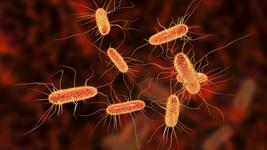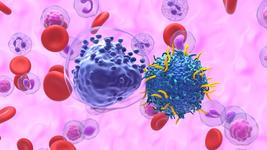Gene-Editing Clinical Trials: Highlights of 2022
CMN Intelligence - The World’s Most Comprehensive Intelligence Platform for CRISPR-Genomic Medicine and Gene-Editing Clinical Development
Providing market intelligence, data infrastructure, analytics, and reporting services for the global gene-editing sector. Read more...
2022 was a busy year in the gene-editing field, with multiple new clinical trials initiated for gene-editing therapeutic candidates, and progression of a number of ongoing trials with encouraging signs of safety and efficacy. In this roundup we highlight some of the key advances from 2022 in gene-editing trials for cancer, haemoglobinopathies and rare diseases.
Paediatric leukaemia in remission after base-editing cancer treatment in UK
In December, Great Ormond Street Hospital (GOSH) in the UK released details of its first-in-human clinical trial using base-edited CAR-T cells. In May 2022, and facing the prospect of palliative care at the time, 13-year old Alyssa from Leicester in the UK became the first reported patient in the world to receive base-edited T cells, in collaboration with the University College London Great Ormond Street Institute of Child Health.
Alyssa had been diagnosed with T-cell acute lymphoblastic leukaemia, and at the time of dosing with the experimental therapy at GOSH, she had exhauasted all conventional treatment options for her disease, including chemotherapy and bone marrow transplant. The experimental base-edited treatment consisted of healthy donor T-cells that were engineered ex vivo (outside the body) with a base editor before being infused into the patient's blood. The donor-derived base-edited cells were engineered through several steps to ensure that they would not be attacked by the recipient's immune system, that they would not attack and destroy each other, that they would not be destroyed by any other cancer treatment, and they were specifically engineered to recognoise and destroy cancer cells.
GOSH shared that Alyssa's disease was in remission within 28 days of her treatment, and following a second bone marrow transplant to restore her immune system, she continues to do well at home with regular follow ups at GOSH. The team leading the trial is now aiming to recruit up to ten patients with T-cell leukaemia who have exhausted all other treatment options.
Positive 12-month clinical data in cancer trial for first PD-1 knockout CAR-T candidate
In December 2022, Caribou Biosciences reported new 12-month clinical data from cohort 1 in the ongoing ANTLER Phase 1 trial of CB-010 for relapsed or refractory B cell non-Hodgkin lymphoma (r/r B-NHL). The latest data demonstrates long-term durability following a single infusion of CB-010 at the initial dose level 1 (40x106 CAR-T cells).
CB-010 is a CRISPR-edited off-the-shelf allogeneic anti-CD19 CAR-T cell candidate in which the PD-1 gene is also deleted. This gene encodes the PD-1 protein that functions as a safety switch on T cells that cancer cells turn on to protect themselves from T cell-mediated immune responses. CB-010 was the first allogeneic CAR-T cell therapy with a PD-1 deletion to be cleared for a clinical trial.
The most recent data revealed that 6 out of 6 patients in cohort 1 achieved a complete response (CR) as best response, 3 of 6 patients maintained a durable CR at 6 months, and 2 of 6 patients maintain a long-term CR at the 12-month scan and remain on the ANTLER trial. CR specifically refers to the disappearance of all signs of cancer in response to treatment (also known as remission). The company also reported 18 months as the longest CR maintained to date in the ANTLER trial, and this was achieved by the first patient dosed with CB-010. CB-010 was generally well tolerated with adverse events consistent with autologous or allogeneic anti-CD19 CAR-T cell therapies. New data from higher dose cohorts is expected in 2023.
In October 2022, Iovance Biotherapeutics announced that the first patient had been dosed and completed the safety observation period in a Phase 1/2 trial for IOV-4001. IOV-4001 is Iovance’s TALEN-modified, PD-1-inactivated tumour-infiltrating lymphocyte (TIL) therapeutic candidate for several solid cancers. IOV-GM1-201 is investigating the safety and efficacy of IOV-4001 in patients with previously treated metastatic non-small cell lung cancer or advanced melanoma. You can read more about this in a previous clinical update here.
The first allogeneic CAR T Phase 2 trial is initiated
In October 2022, Allogene Therapeutics announced that it was initiating a potentially pivotal Phase 2 clinical trial of ALLO-501A in patients with relapsed or refractory large B-cell lymphoma. ALLO-501A is an anti-CD19 CAR T-cell therapeutic candidate that is generated from healthy donor cells. ALLO-501A is TALEN-edited in a number of ways to mitigate the risk of graft-vs-host disease (GVHD), which is a known downside to using donor-derived or allogeneic therapies, and to equip the therapeutic cells with other beneficial features that should allow them to persist in the recipient long-term. Progression of the ALPHA2 trial to Phase 2 marks the first Phase 2 trial for an allogeneic CAR T product. Full details about the Phase 2 trial can be found in the company's press release, while you can read more about the design and therapeutic strategy behind ALLO-501A in our previous clinical news update here.
Cellectis, which is also developing a pipeline of TALEN-edited CAR-T cell therapies for cancer, announced positive preliminary clinical data for two of its programmes in December 2022. This update relates to the ongoing Phase 1/2a BALLI-01 trial for UCART22 in acute lymphoblastic leukaemia and the Phase 1 AMELI-01 trial for UCART123 in acute myeloid leukaemia.
Hope for haemoglobinopathy patients as approval for CRISPR therapy edges closer
CRISPR Therapeutics' and Vertex Pharmaceuticals' jointly-developed CRISPR candidate exagamglogene autotemcel (exa-cel, formerly CTX001) edged a step closer to regulatory approval in the U.S. in September 2022, when the FDA granted a rolling review for the potential one-time cure for sickle cell disease (SCD) and transfusion-dependent beta-thalassemia (TDT).
Exa-cel is an ex vivo CRISPR-Cas9-based candidate therapy that edits a patient's haematopoietic stem cells to reactivate the production of foetal haemoglobin (HbF). HbF is highly expressed and critical during foetal development, and is then rapidly suppressed early in life. HbF reactivation has emerged as an attractive strategy to treat sickle cell disease and beta thalassemia by compensating for the lack of functional adult haemoglobin seen in these disorders, which belong to a family of blood diseases known as the haemoglobinopathies.
If approved, exa-cel will become the first CRISPR therapy to reach regulatory approval. According to the most recent press release concerning exa-cel, the companies expect to complete the U.S. submission package in Q1 2023. Based on positive clinical progress, exa-cel has been granted multiple significant regulatory designations, including Regenerative Medicine Advanced Therapy (RMAT), Fast Track, Orphan Drug, and Rare Pediatric Disease Designations from the FDA for both SCD and TDT. Exa-cel has also been granted Orphan Drug Designation (ODD) from the European Commission, as well as Priority Medicines (PRIME) designation from the EMA, for both SCD and TDT. You can read more about the therapeutic strategy behind exa-cel and previous clinical data here.
Positive results for in vivo CRISPR therapy for rare disease hereditary angioedema
Hereditary angioedema (HAE) is a rare genetic disease that is characterised by severe, recurring and unpredictable inflammatory attacks with swelling in organs and tissues throughout the body. Intellia Therapeutics is developing NTLA-2002, an in vivo CRISPR-Cas9-based therapy designed to cure HAE, which is being evaluated in a Phase 1/2 trial in New Zealand.
Plasma kallikrein is a protein that is known to drive multiple inflammatory pathways, including the production of the inflammatory mediator bradykinin, which is overproduced in HAE. Plasma kallikrein inhibition is among the current treatment approaches to HAE. NTLA-2002 is specifically designed to knock out the kallikrein B1-encoding gene in hepatocytes to permanently reduce plasma kallikrein activity and hence halt the production of bradykinin.
In November 2022, the company presented interim clinical data from the ongoing trial in an oral presentation at the American College of Allergy, Asthma & Immunology (ACAAI) 2022 Annual Scientific Meeting. The data presented come from 10 adult patients with HAE in the Phase 1, dose-escalation part of the study, with a data cut-off date of September 28th, 2022. Single doses of 25 mg, 50 mg and 75 mg of NTLA-2002 were administered via intravenous infusion, and changes from baseline values of plasma kallikrein protein were measured for each patient. The company reported that the treatment was was generally well-tolerated, as well as robust reductions in plasma kallikrein levels and HAE attack rates at all doses tested. The first three patients dosed with NTLA-2002 are reported to have an ongoing attack-free interval of 5.5 – 10.6 months after a single treatment. You can read more about the design of NTLA-2002 as well as previous clinical updates here.
Intellia Therapeutics is also sponsoring a second in vivo CRISPR-Cas9 theraepeutic candidate NTLA-2001 in a Phase 1 clinical trial for transthyretin (ATTR) amyloidosis in collaboration with Regeneron Pharmaceuticals. ATTR is a rare, progressive disease, in which a protein known as TTR becomes misfolded and accumulates as plaques in tissues throughout the body. In early 2022, Intellia released clinical data that demonstrated rapid, deep and sustained responses in a cohort of 15 patients with hereditary transthyretin (TTR) amyloidosis with polyneuropathy (ATTRv-PN). In November 2022, interim data from 12 patients ATTR amyloidosis with cardiomyopathy (ATTR-CM) in the cardiomyopathy arm of the same trial revealed demonstrated deep and consistent TTR reduction following a single dose of NTLA-2001.
Base-editing cholesterol-reducing therapy reaches the clinic
In July 2022, Verve Therapeutics disclosed that the first patient had been dosed in the global heart-1 clinical trial for heterozygous familial hypercholesterolemia (HeFH), a common and potentially life-threatening subtype of atherosclerotic cardiovascular disease (ASCVD).
The Phase 1b heart-1 trial is evaluating VERVE-101, which is a novel, investigational base-edited medicine developed by Verve and designed to be a single-course treatment that permanently turns off the PCSK9 gene in the liver to reduce disease-driving low-density lipoprotein cholesterol (LDL-C).
No clinical data has yet been released from the trial, but pre-clinical data published in 2021 demonstrated LDL-C reduction in non-human primates, as well as off-target editing analysis that demonstrated no off-target editing across 244 potential sites in human liver cells. We spoke with Verve CEO Sekar Kathiresan shortly after the first patient was d$osed with VERVE-101, who told us that VERVE-101 is designed to provide therapeutic benefit to both FH patients and non-FH patients suffering from heart disease, and that the company hopes to one day use VERVE-101 to treat all atheroscleotic cardiovascular disease as a whole, and even as a preventative step before the onset of heart disease.
Stay tuned for more updates
We are excited to see what happens in the gene-editing field in 2023 and we will continue to update you with clinical and research news. In the meantime, you can find all of our coverage on clinical-stage gene editing programmes here.
For a complete overview of current gene editing clinical trials, check out CRISPR Medicine News' Clinical Trials Database.
To get more of the CRISPR Medicine News delivered to your inbox, sign up to the free weekly CMN Newsletter here.
Tags
CLINICAL TRIALS
Sponsors:
Base Therapeutics (Shanghai) Co., Ltd.
Sponsors:
Base Therapeutics (Shanghai) Co., Ltd.







